The First Grade
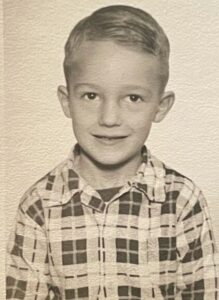 Mom woke me at dawn. I washed up, put on my new school clothes, and grabbed my Roy Rogers lunch box. She walked me down our dirt driveway and held my hand while we stood on the shoulder of Route 60, waiting for the school bus.
Mom woke me at dawn. I washed up, put on my new school clothes, and grabbed my Roy Rogers lunch box. She walked me down our dirt driveway and held my hand while we stood on the shoulder of Route 60, waiting for the school bus.
It was the first day of the first grade, and I was scared. There were no pre-schools or kindergartens where I lived, so I didn’t know what to expect.
Mom was scared, too. Her hand tightened around mine when the bus came over the hill, and she had tears in her eyes when she helped me up the steps and sat me in the front seat.
The bus pulled away and rolled along towards Williamsburg, stopping to pick up kids at falling-down shacks, trailer courts, and truck farms. At a run-down gas station, Georgie Thompson, another first grader, climbed aboard and sat next to me. Too scared to talk, neither of us breathed a word until the bus pulled up in front of a dark hulking brick building that looked like a jailhouse, whereupon Georgie said in a small voice, “Oh, God.”
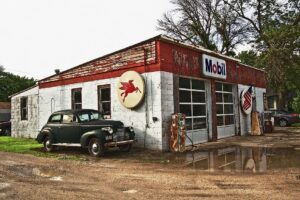
Two sixth-grade girls were waiting for us on the curb. They pulled us by the hand into Matthew Whaley Elementary School and down a long hall through a swarming frenzy of shouting, laughing kids. Georgie’s guide shoved him through a door on the left; mine pushed me into a classroom on the right.
Mrs. Pearson, a short frail gray-haired teacher, met me at the door and sat me down at a table with other dazed first graders. After a few more stunned kids trickled into the room, she launched into a welcome-to-school speech.
In the middle of it, a tall stout woman dressed in Sunday-go-to-church clothes appeared at the door.
“It’s the principal,” a girl at my table hissed. “Somebody’s in big trouble.”
“Is there a Kenny Oder here?” the principal asked.
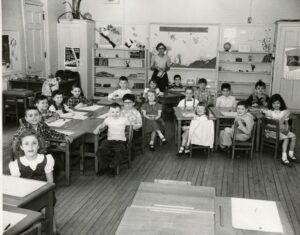 My stomach did a backflip.
My stomach did a backflip.
Mrs. Pearson pounced on me and handed me off to the principal. With a grip as tight as a pair of pliers, she pulled me across the hall into another classroom and plopped me down in a chair next to a boy slumped over a desk bawling hysterically at the top of his lungs.
“Calm down now,” the principal said to the boy. “Here’s the friend you asked for.”
The boy raised his head and looked at me. I sucked in my breath at the sight of my dreaded childhood nemesis, Robert West. Once a week Robert visited his ten-year-old cousin, who lived next door to me, and they teamed up to torment me mercilessly. Robert tried to make me cry every time he came around, and with his cousin’s help, he usually succeeded. I hated him.
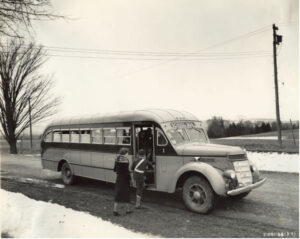 Robert stopped crying when he saw me and clamped his sweaty hand onto mine. I tried to jerk free, but he held on like his life depended on it. He scooted his chair closer to mine and grabbed my arm with his other hand. I couldn’t make him let go, so we sat like that until the principal finally returned, disentangled me from Robert, and took me back to my class.
Robert stopped crying when he saw me and clamped his sweaty hand onto mine. I tried to jerk free, but he held on like his life depended on it. He scooted his chair closer to mine and grabbed my arm with his other hand. I couldn’t make him let go, so we sat like that until the principal finally returned, disentangled me from Robert, and took me back to my class.
“Thank you, Kenny,” she said. “You’ve been a big help to your friend.”
Inside my head I screamed, “He’s not my friend! He’s a big dog turd!” But out loud all I could manage was a meek “Okay.”
I don’t remember the rest of the day except that Mom hugged me for a long time when I got off the bus, and later when I told her about Robert, she laughed so hard she cried.
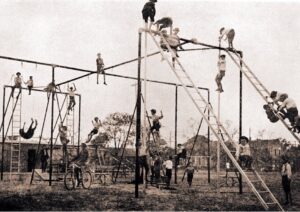 The first grade turned out to be fun for the most part – storytime, craft time, nap time. Recess was the best. They turned us loose on a playground that would qualify as a killing field under today’s safety standards. No plastic slides, rubber mats, or guardrails, and a fall from the giant iron jungle gym’s monkey bars held the promise of permanent paralysis, if not outright death.
The first grade turned out to be fun for the most part – storytime, craft time, nap time. Recess was the best. They turned us loose on a playground that would qualify as a killing field under today’s safety standards. No plastic slides, rubber mats, or guardrails, and a fall from the giant iron jungle gym’s monkey bars held the promise of permanent paralysis, if not outright death.
Miraculously, I didn’t get hurt on the playground. As it turned out, a much greater menace lurked on the school bus. Our bus carried kids in grades one through twelve, and the big kids bullied the little ones. I was especially afraid of a teenager I’d heard talking to other boys about washing his hands in the blood of a deer he’d killed and strangling chickens just to hear their panicked death-squawks. I was careful to stay away from him, but one day when I got on the bus the only open seat was behind him.
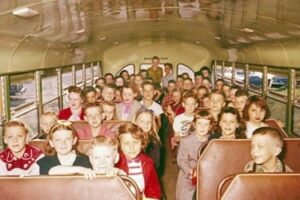 He turned around and smiled at me with a wounded look in his eyes, sad and hurt, but mean at the same time. He reached over the seat, wrapped his hands around my throat, and began to choke me. I don’t know if the other kids didn’t notice or just didn’t care, but none of them did anything.
He turned around and smiled at me with a wounded look in his eyes, sad and hurt, but mean at the same time. He reached over the seat, wrapped his hands around my throat, and began to choke me. I don’t know if the other kids didn’t notice or just didn’t care, but none of them did anything.
I clawed at the boy’s wrists, but his grip only tightened and his sick smile grew wider. I couldn’t breathe and I couldn’t scream.
Polly Crawford was a fat ugly eighth-grader with dirty hair who smelled bad. No one liked her. That’s why the seat next to her was empty when I got on the bus.
“Let him go,” Polly said.
The boy squeezed harder. My vision began to fade.
“I said let him go!”
“Shut up,” the boy said.
Polly slapped him as hard as she could. He let go of me and lunged at Polly.
I must have fainted because the next thing I recall is lying on the floor, coughing and gagging.
There was a big fight. The driver, a William and Mary student, stopped the bus, threw the boy off, picked me up, sat me beside Polly, and drove on as though nothing had happened.
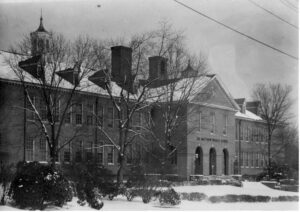
Where I lived you had to be tough, even as a little boy. For the rest of the year I sat beside Polly every chance I got and avoided the boy as best I could, but I didn’t report him to the principal or anyone else. I didn’t even tell Mom and Dad about him.
As a counterbalance to that god-awful trauma, the first grade produced one of the most important learning experiences of my life. One afternoon Mrs. Pearson arranged our chairs in a circle and asked us to share stories about our fathers’ jobs. The first kid said her dad was an engineer at VEPCO. A boy’s dad worked for Chesapeake Bank. And so on. No one’s dad did anything interesting, and the stories about them were deadly boring.
When Mrs. Pearson called on me, I started to say my dad sold cars, but a strange feeling came over me and I fell silent.
“Kenny?” Mrs. Pearson said.
I looked at her blankly.
“What does your father do for a living?” she said, trying to get me back on track.
The strange feeling swelled up inside me. “My dad drives airplanes in big races every Saturday in Richmond,” I said.
The kids perked up.
“Your dad races airplanes?” the boy next to me said, awe-struck.
“ Yeah. He almost crashed in the last race.”
Yeah. He almost crashed in the last race.”
Everyone stared at me, wide-eyed.
Ideas bubbled up so fast my mouth could barely keep pace with my brain. I put Dad in a blue plane shaped like a cigar with wings, smaller than the others, but sneaky fast, dipping, rising, zig-zagging, and soaring. The kids were on the edge of their chairs when Dad lost power and had to use the gasoline choke to restart the engine and pull the plane up off the ground just before it crashed, and they were hanging on my every word when Dad opened the throttle, steadily gained on the other planes, caught the leader at the end, and won by a nosecone.
After the kids stopped cheering, I looked at Mrs. Pearson. Her mouth was hanging open. A chill went up my spine. She knows it’s a big lie, I thought. She’s going to yell at me.
But she didn’t yell. Instead, she said, “That was a wonderful story, Kenny, and you told it well.”
Then she called on the girl to my left, whose father was an accountant. While the girl droned on about keeping track of bills, Mrs. Pearson smiled at me. I smiled back, and a bond formed between us that inspired me long after I left her class.
That was my first story; it was really fun to tell; and it set me on a long winding path that eventually led to Whippoorwill Hollow.
Several months ago, almost seven decades after Dad won that airplane race, my deep well of stories finally seemed to have run dry. I tried hard, but nothing good came forth. With more than a little sadness, I stopped writing and told Bobbye to let my blog go quietly into that goodnight.
A few weeks passed. Then Against All Odds cried out to me. Turning Points came along soon afterwards. The Downfall followed. Now this one. As I close it out, I hear more ghost-voices whispering from the bottom of that deep well.
The time to quit may come someday, but it seems I’m not there yet.
Post Script: “There is no greater agony than bearing an untold story inside you.” Maya Angelou



September 29, 2021 @ 6:15 pm
So glad you didn’t quit telling stories, Ken. This is another wonderful one.
September 30, 2021 @ 9:08 am
Thanks, Gay. I guess I’ve got a few more left in me.
September 27, 2021 @ 9:24 pm
Great story Ken. I hardly remember first grade.
September 28, 2021 @ 8:40 am
Thanks, Ursula. For some reason I remembered these incidents vividly, but not much else from that year.
September 26, 2021 @ 2:57 pm
John Lennon said that Paul McCartney could find a melody in a paper bag. In that same vein, as long as there are blank pieces of paper (or empty computer screens) you will continue not only to find the best stories to tell but also the best way to tell them. So I am not worried; your well is nowhere near dry. Just keep ’em coming.
September 26, 2021 @ 4:34 pm
Thanks, Joel. I hope you’re right. I really appreciate your encouragement. You’re a great friend!
September 26, 2021 @ 8:26 am
Great story! About the only significant thing I remember about first grade was that there were so many students that the first grade had separate morning and afternoon sessions. The first semester I was in the afternoon session. The second semester I was in the morning session. We lived in the City of Charlottesville in the Venable School district. The classes were definitely crowded.
Keep the stories coming. They kindle old memories!
September 26, 2021 @ 8:59 am
Thanks, Randy. My memory of that year is a mix of vivid scenes like those in this post and a big blur covering most of the rest of it. When you think of, or try to write, about those days a lot you’ve forgotten comes back to you. C’ville must have been very crowded 68 years ago to split the school day like that.
September 26, 2021 @ 7:01 am
Great story Ken! I am impressed that you remember so much from 1st grade. I can’t remember what I did last week. But seriously, you gave me the first laugh of the day. Don’t stop writing. Keep those laughs coming. ?
September 26, 2021 @ 8:55 am
Thanks, Sharon. I can’t remember what I did last week either, but when I write these things the past comes back to me, slowly at first, then in a rush. There’s still a lot I can’t remember about those days, though.
September 25, 2021 @ 12:46 pm
Love this story and as I have heard over and over.….….…..stories are gifts.
I have been writing some for my grandchildren. They need to know what life was like in the 50s and 60s.
And yes I remember Mr. Trice!
September 25, 2021 @ 1:21 pm
Thanks, Barbara. I’m glad to hear you’re writing. As you say, stories are a gift.
September 25, 2021 @ 8:23 am
Ken — Glad to know you are still tapping the well. My first grade teacher was Mrs. Shrewsberry. No kidding. I cried, literally, every day before school that year. I’m sure I could blame her for one of my many neuroses. I sent you an email about lunch. I’ll try again. I really like the photos too.
September 25, 2021 @ 9:43 am
Hey Mike, The first grade can be a tough slog. Mrs. Pearson made it easier for me. I responded to your message by email about lunch. Twice. Got nothing back. There must be some kind of problem. I have to be over there for a 1:00 p.m. appt on Oct. 4. Maybe we could join up for an early lunch. Send me an email on my sugarhollow address.
September 25, 2021 @ 7:55 am
I am delighted when I see that you have posted another remembrance! I can see old Route 60, and ugly rickety school bus, and the characters you describe become people on my old bus, #36. The driver, Joe Trice, later a science teacher at AHS, would pull the bad boys off the bus and beat them with his belt. Isn’t it amazing how much life has changed?
September 25, 2021 @ 9:40 am
Thanks, Glenna. I wish my bus driver had used his belt on that kid that tried to kill me. I vaguely remember the name Joe Trice. He may have been teaching when I was teaching there. I’ll look him up in one of my yearbooks. Thanks for following my blog. Your encouragement means the world to me.
September 25, 2021 @ 7:17 am
Wow, Ken… you’ve been gifted with such a marvelous depth of imagination and articulation, evidenced even in first grade!
I’m grateful to be on the sidelines.
September 25, 2021 @ 7:41 am
Thanks, Eric. I’m grateful you are there, too. Our friendship has spanned distance and years of separation. It means so much to me.
September 24, 2021 @ 8:59 pm
Love it thank you so much you are a gifted writer
September 25, 2021 @ 7:40 am
Thanks, Janet. I appreciate your encouragement so much, as always.
September 24, 2021 @ 4:02 pm
Keep ’em coming Ken.
September 24, 2021 @ 8:38 pm
Thanks, Tom. I’ll try.
September 24, 2021 @ 3:31 pm
I always enjoy your remembrances — what a pleasure those schoolbuses were in growing up …. Not tome for you to stop — not yet …..
September 24, 2021 @ 8:37 pm
Thanks, Dan. I’ve still got more to write, I hope.
September 24, 2021 @ 1:47 pm
This, and all the stories you post, are absolutely delightful. I hope you keep them coming ❤️
September 24, 2021 @ 2:08 pm
Thanks, Jeni! I appreciate you following my blog.
September 24, 2021 @ 12:18 pm
Love your stories Ken! Keep ’em coming!
September 24, 2021 @ 12:34 pm
Thanks, Gary!
September 24, 2021 @ 11:12 am
I somehow think (and pray) that The Stories will continue to flow from that fertile mind!
September 24, 2021 @ 11:39 am
Thanks, Don. I hope they keep coming along. That little dry spell was sad and boring.
September 24, 2021 @ 10:57 am
This is so well told and brings to mind the black and white memories of my first grade classroom, where Mrs. Nelson did NOT like my story/fibs or my imitating her while standing on the top of my desk while she was out of the room. Be that as it may, today I stand here wagging my little rear in her face. I hope you never stop these coming. Each and every one is an enjoyable read.
September 24, 2021 @ 11:36 am
Thanks, Rebecca. So you made it to the big-time novel writing career despite Mrs. Nelson. Not sure where I’d be if Mrs. Pearson had smacked me down that day. I’m really glad you powered through all the way to Deadly Thyme, though!
September 24, 2021 @ 10:39 am
So glad the stories keep bubbling up…..
September 24, 2021 @ 11:33 am
Thanks, Sharon!
September 24, 2021 @ 10:22 am
Somewhere Mrs. Pearson is saying “That was a wonderful story, Kenny, and you told it VERY WELL. Please don’t ever stop telling stories.”
Thanks for sharing your stories with us. You make us laugh and cry and remember our own stories. ??
September 24, 2021 @ 11:33 am
Thanks, Lucian. Mrs. Pearson was generous and kind. She made a big difference in my life.